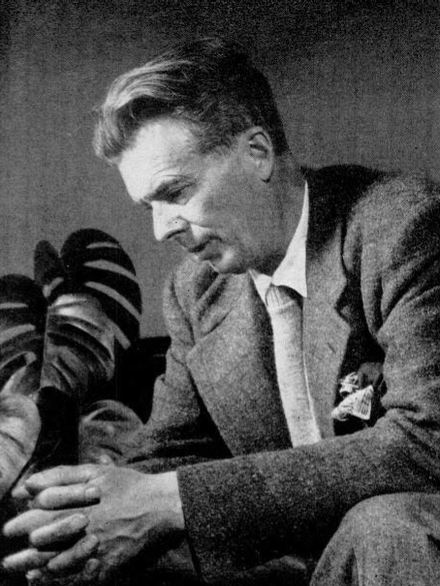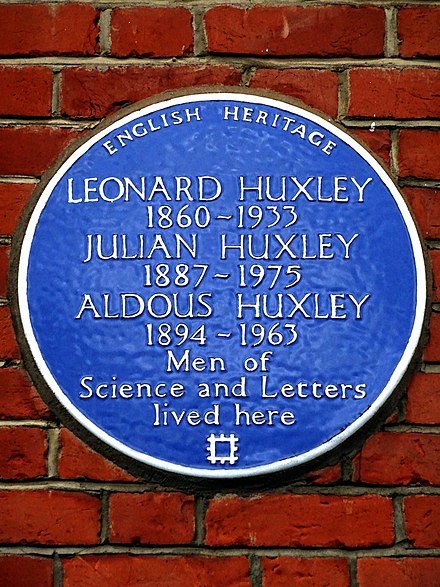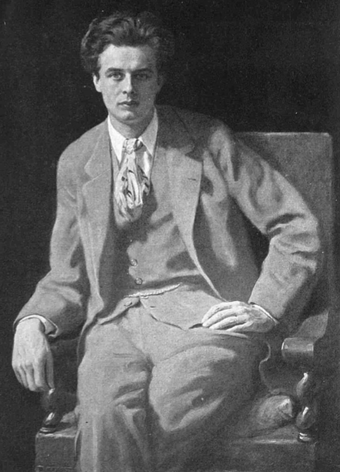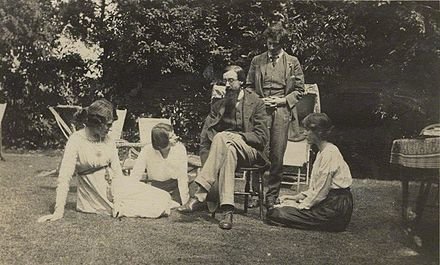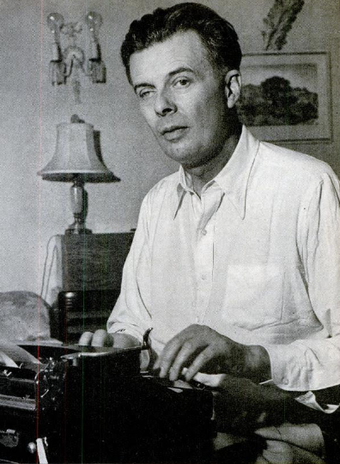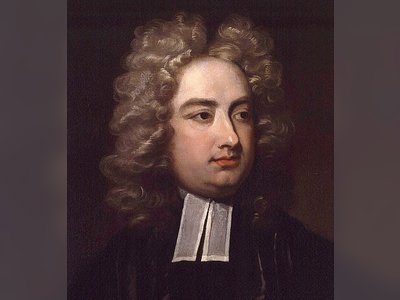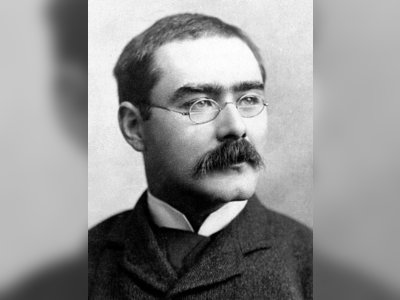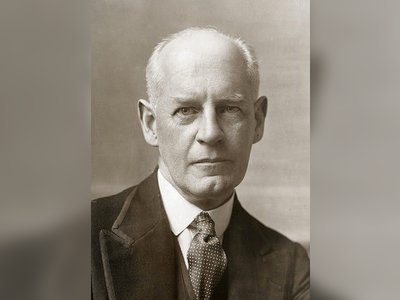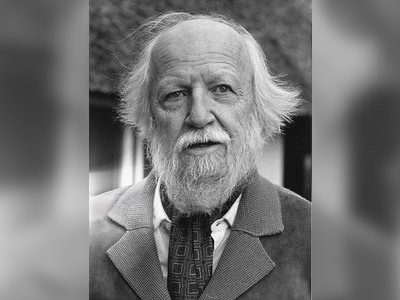British Heritage
Remember, Cherish, Learn.
beta
Aldous Huxley
Aldous Huxley's Contribution to British Heritage.
Aldous Leonard Huxley, a renowned English writer and philosopher, left an indelible mark on British heritage through his prolific literary output, profound philosophical ideas, and innovative approach to literature. Born on July 26, 1894, into the distinguished Huxley family, he was surrounded by intellectualism from a young age. Huxley's legacy lies in his nearly 50 books, comprising both novels and non-fiction works, as well as his essays, narratives, and poems. His works span various genres, including travel writing, satire, and screenplays, making him a multifaceted and influential figure in the literary world.
Huxley's journey into the world of literature began with his education at Balliol College, Oxford, where he studied English literature. Despite facing personal challenges, such as partial blindness due to an eye disease called Keratitis punctata, Huxley demonstrated remarkable resilience and intellectual prowess. His unique vision and universal outlook on knowledge allowed him to transcend traditional boundaries and explore diverse disciplines. This ability to embrace all knowledge as his province became a defining characteristic of his intellectual legacy.
Huxley's impact on British heritage is particularly evident in his exploration of philosophical mysticism and universalism. He delved deeply into subjects such as The Perennial Philosophy, published in 1945, which drew parallels between Western and Eastern mysticism, demonstrating their commonalities. In 1954, Huxley penned The Doors of Perception, a seminal work that discussed his own psychedelic experiences with mescaline, providing insights into altered states of consciousness.
Two of Huxley's most famous works are Brave New World (1932) and Island (1962), which presented contrasting visions of dystopia and utopia, respectively. Brave New World showcased a society driven by mass production and behavioral conditioning, serving as a warning against the dehumanizing aspects of scientific progress. On the other hand, Island offered a hopeful portrayal of an idealized society with a focus on human potential and spiritual growth.
In 1937, Huxley moved to the United States, specifically to Los Angeles, where he resided until his passing in 1963. During his time in the U.S., Huxley continued to write prolifically and engaged with various spiritual and philosophical ideas. He developed a close association with the Vedanta Society of Southern California, which exposed him to Vedanta philosophy, meditation, and vegetarianism. Huxley's interest in Eastern wisdom traditions coexisted harmoniously with his appreciation for modern science, allowing him to embrace a unique blend of perspectives.
Huxley's engagement with psychedelic substances, notably mescaline and LSD, further enriched his philosophical outlook. These experiences influenced his ideas on human potential, ecological concerns, and the need for a more holistic approach to understanding reality. Huxley's advocacy for training in general semantics and the cultivation of pure receptivity underscored his forward-thinking and visionary mindset.
Aldous Huxley's contributions to British heritage are far-reaching and enduring. His thought-provoking literary works, philosophical explorations, and interdisciplinary approach continue to inspire generations of readers and thinkers. Huxley's vision of a society torn between dystopia and utopia resonates with contemporary discussions on the impact of technological advancements and the pursuit of human well-being.
His writings on the mystical experience, ethical implications of science, and the potential for human transformation have left a lasting impression on the fields of psychology, philosophy, and literature. Although Huxley's ideas were often ahead of his time, they have found relevance and significance in shaping contemporary discourse on spirituality, human consciousness, and the quest for a balanced and harmonious world.
In addition to his literary contributions, Huxley's association with the Vedanta Society of Southern California, his involvement with the Human Potential Movement, and his influence on figures like Timothy Leary have left an indelible mark on the cultural and spiritual landscape of the United States.
Aldous Huxley's timeless insights into the human condition, combined with his fearless exploration of consciousness and society, have secured his place as one of the foremost intellectuals of the 20th century. His intellectual curiosity, visionary ideas, and enduring legacy continue to inspire and challenge readers, ensuring that his impact on British heritage and the global intellectual landscape will be felt for generations to come.
Early Life and Education
Huxley's journey into the world of literature began with his education at Balliol College, Oxford, where he studied English literature. Despite facing personal challenges, such as partial blindness due to an eye disease called Keratitis punctata, Huxley demonstrated remarkable resilience and intellectual prowess. His unique vision and universal outlook on knowledge allowed him to transcend traditional boundaries and explore diverse disciplines. This ability to embrace all knowledge as his province became a defining characteristic of his intellectual legacy.
Literary and Philosophical Contributions
Huxley's impact on British heritage is particularly evident in his exploration of philosophical mysticism and universalism. He delved deeply into subjects such as The Perennial Philosophy, published in 1945, which drew parallels between Western and Eastern mysticism, demonstrating their commonalities. In 1954, Huxley penned The Doors of Perception, a seminal work that discussed his own psychedelic experiences with mescaline, providing insights into altered states of consciousness.
Two of Huxley's most famous works are Brave New World (1932) and Island (1962), which presented contrasting visions of dystopia and utopia, respectively. Brave New World showcased a society driven by mass production and behavioral conditioning, serving as a warning against the dehumanizing aspects of scientific progress. On the other hand, Island offered a hopeful portrayal of an idealized society with a focus on human potential and spiritual growth.
Influence in America
In 1937, Huxley moved to the United States, specifically to Los Angeles, where he resided until his passing in 1963. During his time in the U.S., Huxley continued to write prolifically and engaged with various spiritual and philosophical ideas. He developed a close association with the Vedanta Society of Southern California, which exposed him to Vedanta philosophy, meditation, and vegetarianism. Huxley's interest in Eastern wisdom traditions coexisted harmoniously with his appreciation for modern science, allowing him to embrace a unique blend of perspectives.
Huxley's engagement with psychedelic substances, notably mescaline and LSD, further enriched his philosophical outlook. These experiences influenced his ideas on human potential, ecological concerns, and the need for a more holistic approach to understanding reality. Huxley's advocacy for training in general semantics and the cultivation of pure receptivity underscored his forward-thinking and visionary mindset.
Legacy and Impact
Aldous Huxley's contributions to British heritage are far-reaching and enduring. His thought-provoking literary works, philosophical explorations, and interdisciplinary approach continue to inspire generations of readers and thinkers. Huxley's vision of a society torn between dystopia and utopia resonates with contemporary discussions on the impact of technological advancements and the pursuit of human well-being.
His writings on the mystical experience, ethical implications of science, and the potential for human transformation have left a lasting impression on the fields of psychology, philosophy, and literature. Although Huxley's ideas were often ahead of his time, they have found relevance and significance in shaping contemporary discourse on spirituality, human consciousness, and the quest for a balanced and harmonious world.
In addition to his literary contributions, Huxley's association with the Vedanta Society of Southern California, his involvement with the Human Potential Movement, and his influence on figures like Timothy Leary have left an indelible mark on the cultural and spiritual landscape of the United States.
Aldous Huxley's timeless insights into the human condition, combined with his fearless exploration of consciousness and society, have secured his place as one of the foremost intellectuals of the 20th century. His intellectual curiosity, visionary ideas, and enduring legacy continue to inspire and challenge readers, ensuring that his impact on British heritage and the global intellectual landscape will be felt for generations to come.
- Aldous Huxleyen.wikipedia.org
